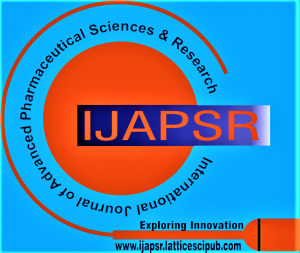![]()
Quantum Computing in Drug Discovery: A Review of Foundations and Emerging Applications
Pushpalata Patil1, Ravindra D. Patil2, Sandeep Kulkarni3
1Dr. Pushpalata Patil, Assistant Professor, School of Business Management, JSPM University, Pune (Maharashtra), India.
2Ravindra D Patil, Assistant Professor, Department of Computer Science, Ajeenkya D Y Patil University, Pune, (Maharashtra), India.
3Dr. Sandeep Kulkarni, Assistant Professor, Department of Computer Science, Ajeenkya D Y Patil University, Pune, (Maharashtra), India.
Manuscript received on 01 June 2025 | First Revised Manuscript received on 09 June 2025 | Second Revised Manuscript received on 12 June 2025 | Manuscript Accepted on 15 June 2025 | Manuscript published on 30 June 2025 | PP: 31-37 | Volume-5 Issue-4, June 2025 | Retrieval Number: 100.1/ijapsr.E407805050825 | DOI: 10.54105/ijapsr.E4078.05040625
Open Access | Editorial and Publishing Policies | Cite | Zenodo | OJS | Indexing and Abstracting
© The Authors. Published by Lattice Science Publication (LSP). This is an open-access article under the CC-BY-NC-ND license (http://creativecommons.org/licenses/by-nc-nd/4.0/)
Abstract: Research Problem: The traditional methods of drug discovery are time-consuming, costly, and at times ineffective. There is a need for more novel approaches that can enhance the processes of discovering new drugs and developing them into usable products. Objective of the Paper: This paper aims to conduct a review of the literature and find how the application of quantum computing can change the way drugs are discovered and processed in practice. Process of Review: The review process involved a comprehensive examination of the available literature and recent advances in the application of quantum computing to drug discovery. The review encompassed major studies, theories, and case studies related to the subject matter, aiming to identify the current state and potential future directions of the domain. Insights of the Review: 1. Primary Building Blocks: With quantum computing, superposition, entanglement, and other principles can be utilised to enable complex computations to be performed at higher speeds using less time than traditional computers. 2. Quantum modelling: Quantum computers are expected to accurately model the interactions of various molecules, which could result in the identification of viable drug candidates. 3. Drug Discovery Processes: Quantum algorithms are capable of faster processing than traditional methods when it comes to solving optimisation problems, such as protein structure prediction and molecular docking, in drug design. 4. Limitations and Challenges: As great as the promise of quantum computing is, it has its limitations and challenges, including hardware limitations, error rates, and the need for specialised algorithms. 5. Future Developments: The ongoing development of quantum hardware and algorithms is expected to enhance the practical applications of quantum computing in drug discovery, enabling the quicker and more cost-effective creation of new drugs.
Keywords: Quantum Computing, Drug Discovery, Disruptive Technology, Artificial Intelligence.
Scope of the Article: Pharmaceutical Analysis
